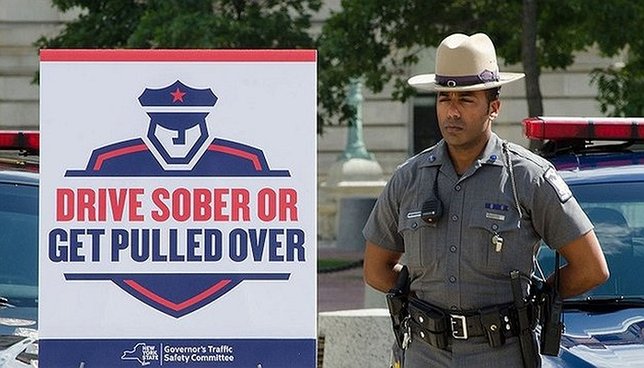Governor Hochul today announced the New York State Police will increase patrols to crack down on drunk, impaired and reckless driving over the July 4th holiday. This special enforcement period will begin at 6 p.m. on Friday, June 30, 2023, and run through 3 a.m. on Wednesday, July 5, 2023.
"We want New Yorkers to have fun this holiday weekend, but they must do so responsibly," Governor Hochul said. "State Police and local law enforcement agencies will once again be out in force on New York's roadways this holiday weekend and we have zero tolerance for drivers whose reckless actions endanger the lives of others and we will hold those who do so accountable."
New York State Police Acting Superintendent Steven A. Nigrelli said, "The Fourth of July is known for its fun and fireworks, but New Yorkers should remember fun can turn fatal if you don't make the right decision. Troopers will be out in force and highly visible this holiday weekend, on the lookout for impaired, drugged, and reckless drivers who put others' lives in danger. Remember, put down the phone, drive sober, follow the rules of the road, and responsibly enjoy your time with family and friends."
New York State Department of Motor Vehicles Commissioner and Chair of the Governor's Traffic Safety Committee Mark J.F. Schroeder said, "One of the great ways to celebrate your independence is never to get into a vehicle with an impaired driver or let a friend drive who is impaired. Let's all honor our nation's birthdate with common-sense steps to get to our destinations safely: make sure all passengers are properly secured, keep to the speed limit, avoid distractions like cell phone usage, and make a plan to stay, get a ride or have a designated driver if you will be drinking alcoholic beverages."
During this enforcement period, drivers can expect to encounter sobriety checkpoints and DWI patrols. Troopers will also be looking for motorists who are using their phones and other electronic devices while behind the wheel. Drivers should also remember to "move over" for stopped emergency and hazard vehicles when they travel New York roadways.
Troopers will be using both marked State Police vehicles and Concealed Identity Traffic Enforcement (CITE) vehicles as part of the operation. The CITE vehicles allow Troopers to more easily identify motorists who are using handheld devices while driving. These vehicles blend in with everyday traffic but are unmistakable as emergency vehicles once the emergency lighting is activated.
During last year's July 4th enforcement period, Troopers issued 11,873 total tickets, arrested 187 people for DWI and investigated 775 crashes, including two fatalities.
The July 4th initiative is partially funded by the Governor's Traffic Safety Committee (GTSC). The GTSC and the New York State STOP-DWI Foundation remind motorists that their "Have a Plan" mobile app, is available for Apple, Droid and Windows smartphones. The app enables New Yorkers to locate and call a taxi or rideshare service and program a designated driver list. It also provides information on DWI laws and penalties, and provides a way to report a suspected impaired driver.
If you drive drunk or drugged, you not only put your life and the lives of others at risk, you could face arrest, jail time, and substantial fines and attorney fees. The average drinking and driving arrest costs up to $10,000.
Arrested drunk and drugged drivers face the loss of their driver's license, higher insurance rates, and dozens of unanticipated expenses from attorney fees, fines and court costs, car towing and repairs, and lost time at work.
The New York State Police, and GTSC recommend these simple tips to prevent impaired driving:
- Plan a safe way home before the fun begins;
- Before drinking, designate a sober driver;
- If you're impaired, use a taxi, call a sober friend or family member, or use public transportation;
- Use your community's sober ride program;
- If you suspect a driver is drunk or impaired on the road, don't hesitate to contact local law enforcement;
- If you know someone who is about to drive or ride while impaired, take their keys and help them make other arrangements to get to where they are going safely.










